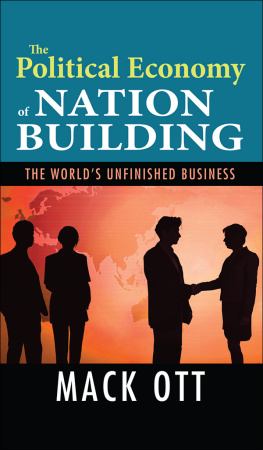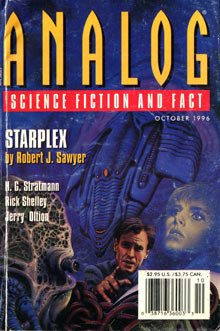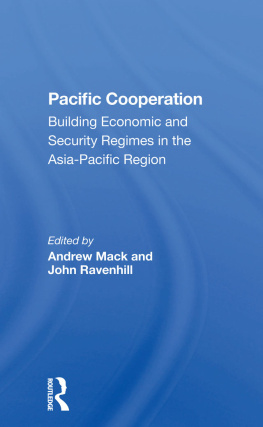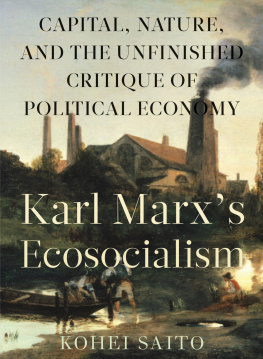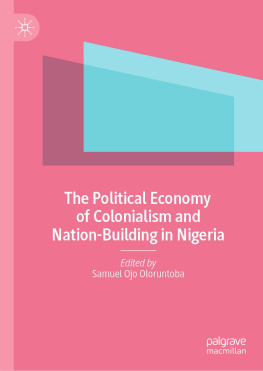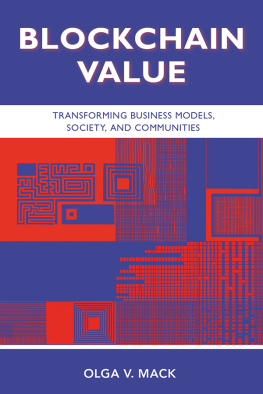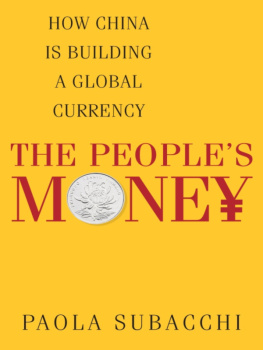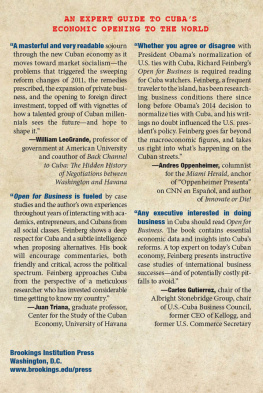First published 2012 by Transaction Publishers
Published 2017 by Routledge
2 Park Square, Milton Park, Abingdon, Oxon OX14 4RN
711 Third Avenue, New York, NY 10017, USA
Routledge is an imprint of the Taylor & Francis Group, an informa business
Copyright 2012 by Taylor & Francis.
All rights reserved. No part of this book may be reprinted or reproduced or utilised in any form or by any electronic, mechanical, or other means, now known or hereafter invented, including photocopying and recording, or in any information storage or retrieval system, without permission in writing from the publishers.
Notice:
Product or corporate names may be trademarks or registered trademarks, and are used only for identification and explanation without intent to infringe
Library of Congress Catalog Number: 2011038327
Library of Congress Cataloging-in-Publication Data
Ott, Mack.
Political economy of nation building : the worlds unfinished business / Mack Ott.
p. cm.
Includes bibliographical references and index.
ISBN 978-1-4128-4742-1
1. Nation-buildingPolitical aspects. 2. Nation-buildingEconomic aspects. I. Title.
JZ6300.O77 2012
327.1dc23
2011038327
ISBN 13: 978-1-4128-4742-1 (hbk)
For Linda, who believed
The fall of the Berlin Wall seemed to prove the superiority of free-market liberal democracy. Then the October 2008 collapse of capital markets and the resulting sharp recessions and financial imbalances throughout Europe and North America raised existential questions regarding the very essence of the Western model. The Collapse of 08 meant that for the first time since Francis Fukuyamas proclaimed the victory of capitalism and the End of History, other models contested the primacy of the Western model and appeared to offer greater stability and robust growth, although at the expense of economic, political, and personal freedoms. Chinaand India in particularemerged from the Collapse of 08 relatively unscathed.
Suddenly, old assumptions appeared shaky: no longer were liberal democracy and market economies the unquestioned victors in the ideological wars. Given the difficulties market-oriented liberal democracies experienced dealing with the Collapse of 08, scholars and laymen alike are posing questions about the very foundations of the Western model. What exactly constitutes liberal democracy? What is a market-based economy? What advantages does it offer over other systems? How did they emerge to form what we today refer to as the modern, liberal nation-state? And are modern liberal democracies and free-market economies inefficient relics of the past, destined to be consigned to the ash heap of history? Will the world end up looking more like China and India than North America and Western Europe?
In this ambitious work, Mack Ott tackles these questions head-on by examining the foundations of the Western model: the societal, political, and economic developments that enabled the modern liberal democratic nation-state and market-based economy to emerge and evolve. Mack Ott draws on his extensive academic background, love for history, and exceptionally rich on-the-ground developmental experience in over thirty different countries, to create an unparalleled convergence of the practical with the theoretical. The author is one of a handful of people with the experience and knowledge necessary to understandmuch less assemble, analyze, and categorizethe vast quantities of material and the numerous cases of social, economic, and political development that have taken place throughout the world, as countries moved from illiberal, statist systems, towards the model of the liberal nation-state with a market driven economy.
This book reaches back through the centuries to discover the roots of modern liberal democracy and its necessary component parts, assess their historical development, and discuss the applicability of the various models for modern developmental purposes. It poses significant challenges to the accepted wisdom of how stable, liberal democratic states develop.
Ott begins by discussing the underlying components of the liberal nation-state, defining a liberal society as one that reflects the ordering implicit in John Lockes Second Essay on Government, the trinity of life, liberty, and property. Locke argued that these three rights are fundamental for members of a liberal society. Security precedes liberty, and both are prerequisites for citizens to give the amicable and valid assent to the social construct known as property. In this Locke-ian sequence, the governments primary duty is to provide security. Only when the state assures the individual security of persons can liberal rights and freedoms, including private property, be fully developedincluding those constraints on the state itself that complete the fullness of the rule of law.
The structures we associate with the liberal nation-state and free-market economies took centuries of trial and error to develop, and were based largely on the emergence of a self-sustaining middle class, which has become largely synonymous with liberal democracy itself. Ott argues that a strong middle class underpins successful modernization and development, and that it is a prerequisite for the development of liberal democracy and a free market.
The argument in favor of a strong middle class is not new: it dates back to Aristotle and was restated by Locke. It is the middle class that has the most to lose from a deterioration of the rule of law or of a collectivization of property or simply the reduction in the security of property rights, and the most to gain from their strengthening. The rule of law provides the middle-class security, collectively and individually. Consequently, a strong middle class is less likely to support populisma system of governance that substitutes the rule of the day for the rule of law.
Ott notes that Lockes sequence has sometimes produced strong men who imposed order, often at the initial cost of freedom, but ultimately laid the foundation for civil accord and peaceful governance, what in medieval England was known as the Kings peace. Using historical evidence, this book points out that one of the subtleand possibly troublingimplications of this is that democracy comes rather late in the evolution of the liberal nation-state and that there are numerous necessary preconditions.
The emergence of democracy from the rule of a strong man was fragile, which explains in part the disdain for democracy that the US founding fathers shared with their British counterparts in the eighteenth and nineteenth centuries, fearing it could become the rule of the mob. The solution to avoiding mob rule was to impose limits on the governed as well as the rulers. The failure to do so in large part explains the French Revolutions failure to deliver lasting democracy and subsequent slide into despotism under a strong man, Napoleon in 1802. So too it helps explain the conditions that led to the rise of Chilean strongman Augusto Pinochet.


